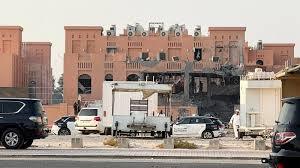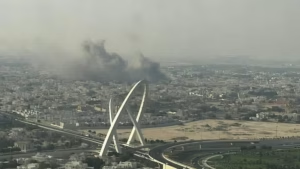Washington D.C. – President Donald Trump expressed strong dissatisfaction with the recent Israel airstrike on Qatar’s capital, stating he was “not thrilled” about the operation targeting Hamas political leaders. The unprecedented attack has created significant diplomatic tensions and threatened regional stability in the Middle East.
The Israel airstrike represents a dramatic escalation in regional conflict, targeting Palestinian militant group Hamas leaders in Doha, Qatar’s capital. Trump’s criticism of the operation highlights growing tensions between traditional allies over military strategy and diplomatic approaches to Middle East peace initiatives.
Trump explicitly distanced himself from the Israel airstrike, emphasizing that “this was a decision made by Prime Minister Netanyahu, it was not a decision made by me.” The President’s statement came hours after the strikes, indicating his administration’s displeasure with Israel’s unilateral military action.
Impact on US-Gulf Relations and Peace Initiatives

The Israel airstrike has delivered a major blow to US-supported efforts to normalize ties with Gulf Arab nations, potentially crippling ongoing ceasefire negotiations in Gaza. The attack on Qatar, a peacetime ally hosting the largest American military base in the Middle East, represents a significant diplomatic challenge for the Trump administration.
Qatar’s wealthy Gulf neighbors were deeply unnerved by the Israel airstrike on Doha, home to one of the world’s biggest sovereign wealth funds and crucial US military installations. The operation has triggered widespread regional condemnation and raised serious questions about future diplomatic cooperation.
The United Arab Emirates, which normalized ties with Israel five years ago under the Abraham Accords brokered by President Trump, warned that the Israel airstrike would have “extremely dangerous repercussions” for regional security. This response from a key US ally demonstrates the operation’s destabilizing impact on carefully constructed diplomatic frameworks.
Regional Condemnation and Diplomatic Fallout


Saudi Arabia, which the US has been pushing to join the Abraham Accords, condemned the Israel airstrike as a “criminal act,” while Qatar labeled it “a flagrant violation of all international laws and norms.” These strong reactions from key regional players indicate the serious diplomatic damage caused by the military operation.
The Israel airstrike has prompted experts to declare that normalization efforts with Gulf Arab states are effectively “dead.” Dina Esfandiary, Middle East Geoeconomics Lead for Bloomberg Economics, stated that “there is no prospect for more normalization with the Gulf Arabs and Saudi Arabia in particular once one of theirs has been attacked.”
This assessment suggests that the Israel airstrike has fundamentally altered the regional diplomatic landscape, potentially undoing years of careful relationship-building between Israel and Arab nations. The operation’s timing and location have created unprecedented challenges for future peace initiatives.
Trump’s Measured Response and Peace Opportunities

Despite his criticism of the Israel airstrike, Trump offered notably muted pushback, suggesting that “this unfortunate incident could serve as an opportunity for peace.” The President’s measured response indicates his administration’s attempt to salvage diplomatic opportunities from a challenging situation.
Trump stated that Netanyahu’s Israel airstrike “did not advance Israel or America’s goals,” highlighting the strategic disagreement between the two leaders. This public criticism of Israeli military action represents a significant diplomatic development, given the traditionally strong US-Israel alliance.
The President’s suggestion that the Israel airstrike could create peace opportunities reflects his administration’s continued commitment to Middle East diplomatic solutions despite current setbacks. This approach demonstrates Trump’s effort to transform military confrontation into diplomatic progress.
Historical Context of Israeli Military Escalation
The Israel airstrike on Qatar represents the latest in a series of increasingly bold military operations conducted by Israel over the past year. The country has previously conducted airstrikes in Syria, Lebanon, and Iran, demonstrating an increasingly aggressive regional posture.
This pattern of escalation culminated in the unprecedented Israel airstrike on a US ally, marking a significant departure from traditional military strategies. The operation’s unprecedented nature has shocked regional observers and diplomatic communities worldwide.
The Israel airstrike’s targeting of Hamas leaders in a neutral country hosting peace negotiations represents a particularly provocative action that has complicated ongoing diplomatic efforts. The timing and location of the operation have raised serious questions about Israel’s commitment to negotiated solutions.
Strategic Implications for Middle East Peace


The Israel airstrike has potentially crippled talks for a ceasefire in Gaza, creating new obstacles for peace initiatives that were already facing significant challenges. The operation’s impact on ongoing negotiations demonstrates how military actions can undermine diplomatic progress.
Regional analysts suggest that the Israel airstrike has fundamentally altered the strategic landscape for Middle East peace efforts. The attack on Qatar, a key mediator in regional conflicts, has removed a crucial diplomatic facilitator from future negotiations.
The operation’s consequences extend beyond immediate military objectives, creating long-term challenges for regional stability and international diplomatic efforts. The Israel airstrike has demonstrated how unilateral military actions can complicate multilateral peace initiatives.
Future Diplomatic Challenges and Opportunities
Despite the immediate negative consequences of the Israel airstrike, Trump’s administration appears committed to finding diplomatic solutions that could emerge from the current crisis. The President’s emphasis on peace opportunities suggests continued engagement with regional stakeholders.

The Israel airstrike has created new diplomatic challenges that will require innovative approaches to regional peace-building. The operation’s impact on traditional alliance structures necessitates fresh thinking about Middle East diplomatic strategies.
Moving forward, the consequences of the Israel airstrike will likely influence regional diplomatic calculations for years to come. The operation has fundamentally changed the strategic environment in which future peace initiatives must operate, requiring adaptive approaches to conflict resolution and regional cooperation.

